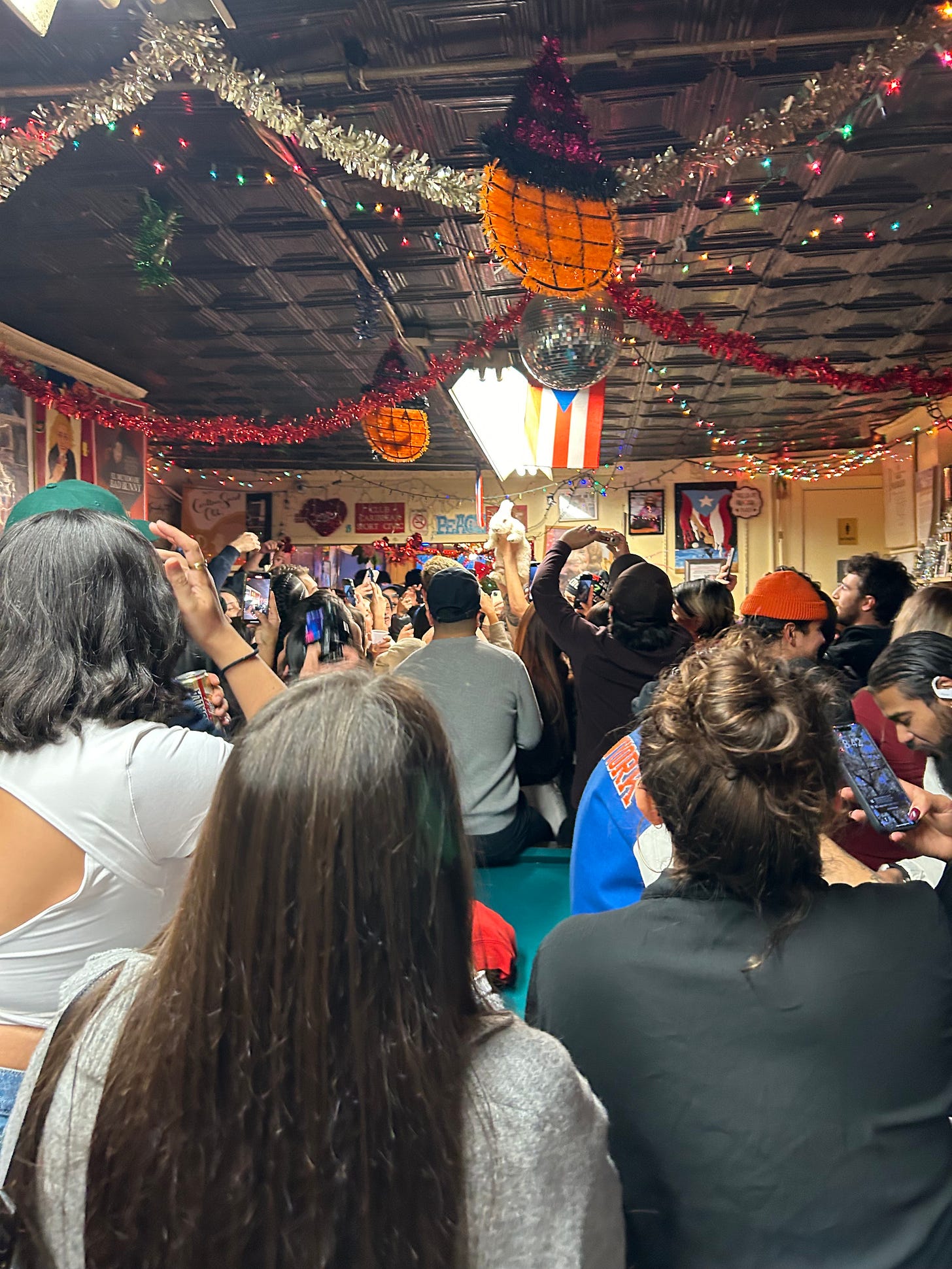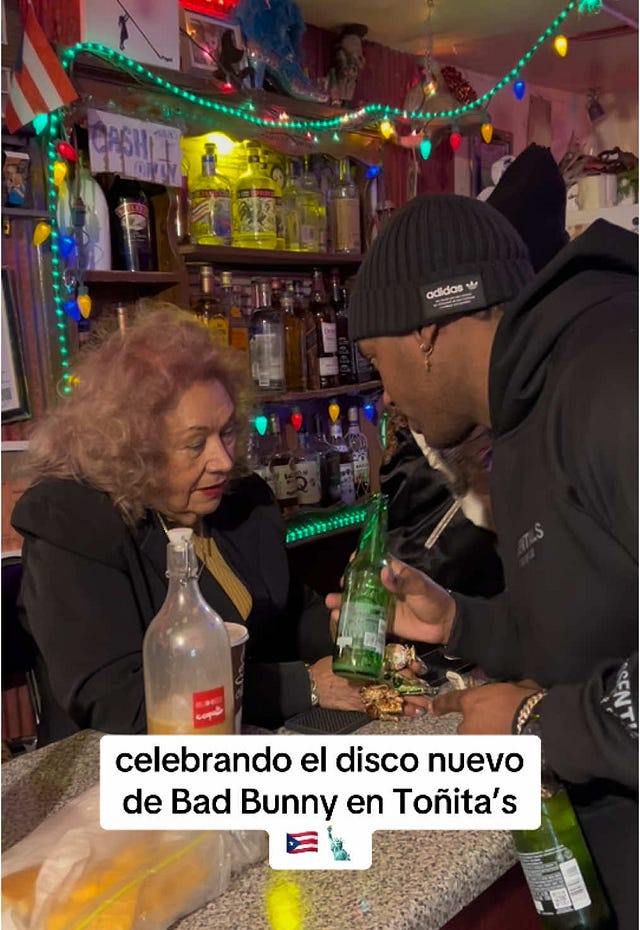Unlike some of my friends, I didn’t get to meet Bad Bunny this month. I had taken my dose of Seroquel to go to bed and was feeling its effects when I got a phone call saying he was at Toñita’s, where I spend most of my weekends since I left Caracas for New York. I got up and paced around the living room – my steps, progressively dopier – as I cursed my luck and debated whether I should call an Uber. Suffice it to say, I spent the following week bummed out, feeling an overwhelming sense of regret. I could’ve given Benito my latest poetry collection, where I quote him on one occasion. I should’ve just passed out on the streets on my way home.
But perhaps, out of all the possible outcomes, no other experience could’ve matched better the animus of Bad Bunny’s new record. After all, as its title very much implies, DeBÍ TiRAR MáS FOToS is an album centered on regret – on remembering and embracing times past, times lost. But regret is not presented here as an obstacle, a paralyzing force, a source of suburban emo wails. Instead, it is grease for our cogs, food for our hearts and hips.
 Tiktok failed to load.
Tiktok failed to load.Enable 3rd party cookies or use another browser
Partying through the regret
Consider the third track of the album, BAILE INoLVIDABLE. Backed by brass instruments, timbales, and a suave piano, this song looks back in enthusiastic lament toward a woman whose affection and dancing skills are irreplaceable. “Pensaba que contigo iba a envejecer / En otra vida, en otro mundo podrá ser,” Bad Bunny sings in the beginning of the song – and repeats until its end. While these lyrics are broody in content, they aren’t uttered but sung with a zeal that matches the chorus and salsa melodies that accompanies them. This seeming obsession over a woman who won’t be back in his arms is not an invitation to weep, but to dance. Consider as well the comical line “Se siente feo no tenerte cerquita / La nueva mama bien, pero no es tu boquita”1 when the song crescendos: the pleasures of the present don’t match previous experiences, yet the realization can be pleasurable in itself.
Similarly, the lyrics of EL CLúB are framed by all-pervasive synths instead of the soundtrack of Caribbean parents and grandparents, inciting us to shake our heads and rave as our unrequited love invades our thoughts. After describing a party scene where his power is absolute – “Las mujere' encima de mí / La hookah, las pastilla' y un blunt / La que yo quiera dice que sí” – Bad Bunny interrupts himself with an inner monologue that takes over the rest of the tune: “¿Qué estará haciendo mi ex? / Que hace tiempo por ahí no se ve / ¿Será que ya me superó y le va bien?,”2 he asks himself over and over, and the more he does so, the more hyped the music gets.
Fuck it. Tonight we have but once choice: turning amorous spite into synth allegrettos is an absolute necessity.
Resignation and remembrance
Last year, Donald Trump won America’s presidential election. That same day, Jenniffer González was elected as Governor of Puerto Rico. Bad Bunny backed Kamala Harris and Juan Dalmau; when he talked in the latter’s closing rally, he seemed convinced that history was in the making, that the popular will was taking the shape of a storm, that something revolutionary was happening. Yet – and excuse for my redundancy – both of his horses lost the race.
Benito’s opposition to the encroaching gentrification of Puerto Rico has also been widely publicized these last few years, as has his frustration with electricity supply failures and government responses to the effects of Hurricane Maria. Because of his work, there has probably never been more consciousness on recurring issues the island has faced as a “Free Associated State” of the United States.
Nonetheless, as Puerto Ricans continue to leave the island at high rates, an ongoing trend since the beginning of the century, thousands of mainland US citizens have moved there in increasingly higher numbers. Per an – surely, appalling for some – ad on Blomberg promoting investment in Puerto Rico, “in 2023, the number of applications for businesses and individuals looking to access tax incentives for relocating increased by 12% compared to the previous year.”
Bearing this in mind, it seems to me like there is a resignation parallel to regret, an abdication toward a hemisphere that has preferred conserving the state of things to progressive politics, that is also vital to DeBÍ TiRAR MáS FOToS. We see this especially in the short film that was posted on YouTube as a teaser to the record a couple of days before it came out, a film about a hypothetical future Borinquen where Puerto Ricans are much scarcer than Americans, where reggaeton music is rarely heard on the streets.
After a scene where our protagonist – perhaps an aged Benito – goes to a bakery, he tells his anthropomorphic-endangered-toad-bud how dumbfounded he was that they were offering vegan quesitos (cream cheese-stuffed pastry rolls that are typical in PR): “I mean, if they’re gonna take the cheese away, might as well call them something else, for real!” It’s a funny scene, for sure, but the metaphor is crushing: if the reggaetonero’s nation continues on the same path, keeping its name might be inadequate, ridiculous even.
When we go over LO QUE LE PASÓ A HAWAii, a song that has induced many to tears per the hundreds of reactions it has had on TikTok, Bad Bunny traces an analogy between a nation that succumbed to American expansionism – and, to a certain extent, to American assimilation – and modern day Puerto Rico.
“Aquí nadie quiso irse, y quien se fue, sueña con volver / Si algún día me tocara, qué mucho me va a doler” he sings; “Quieren quitarme el río y también la playa / Quieren el barrio mío y que tus hijos se vayan / No, no suelte' la bandera ni olvide' el lelolai / Que no quiero que hagan contigo lo que le pasó a Hawái,” he insists in the chorus. Contrast this track’s lower tempo vis-a-vis the rest of the record’s tempo, with the protest anthem El Apagón from his 2022 album, with its upbeat outro, “Que se vayan ellos, que se vayan ellos.”3
This isn’t a straightforward, rageful call to action, but a call to remembrance and retelling: an advice of sorts from someone wiser, older who saw his surroundings change in an undesired manner to a younger generation.
Remembering the past, looking forward to the future
Now, although Bad Bunny has been able to add more strength to his sounds through regret and resignation, while he has brought us an album that leads us to shake our asses and shed some tears, this does not mean that we should run headfirst into it all; it’s one thing to fish for newer, cathartic sounds in their waters, and another is to desire them.
In a manner that would make Jonathan Haidt faint, Benito celebrates smartphones – technology in general – as a way to prevent rue, to make the fullest out of our experiences and achieve newer ones. “I didn’t use to take lots of photos or upload stories or any of that,” the protagonist of the introductory film laments, as if doing so would have made him a less lonely man. Against anti-screen experts who say that taking pictures at concerts and museums impedes us living the moment, Benito wants us to hold on tight to them to live across many moments, to live for longer.
We see this in tracks like DtMF, probably the record’s standout track After going over how he’s “Disfrutando de noche’ de esas que ya no se dan / Que ya no se dan / Pero queriendo volver a la última vez / Que a los ojos te miré,” that is to say, after recognizing how unlucky he feels despite having a privileged time, the title of the album shows up in the hook and is repeated throughout by a joy-exuding chorus: “Debí tirar más fotos de cuando te tuve / Debí darte más beso' y abrazo' las vece' que pude.”4 Bad Bunny regrets not being more mindful of what he had, but there is a solution in his words.
The “should” in the lyrics can become a “could”–thanks to the confidence provided by that which we usually hold in one of our pockets.
Then, in VeLDÁ, a song that evokes the sounds and sexual tension of early 2010s reggaeton, featured artist Dei V sings “Me diste follow y te di followback / Me diste like y yo te di dos pa'trá' / Toma, al otro día me pusiste en los close friends / Eso es lo que tú quieres, ma,” and later wonders in the chorus “Vamo' a ver si es verda', vamo' a ver si es verda', vamo' a ver si es verda'.”5 Instagram and other social media platforms have become the go-to apps for dating for many, especially Gen Z folks, and this track embraces that, sliding into others’ DMs, exploring sex and romance with people you might’ve never interacted with IRL: seizing the moment with our iPhones.
Then, of course, it’s not all about mobile devices. It’s about websites, planes, and other mediums of communication. Take the salsabow tune that opens the record, NUEVAYoL, which samples its chorus, “Si te quieres divertir / Con encanto y con primor / Solo tienes que vivir / Un verano en Nueva York,”6 sampled from El Gran Combo de Puerto Rico’s classic 1975 song. The conditional if here is, I think, revealing: current frustration or acceptance of past choices might overcome you, but good choices are still to be made – especially when we follow the suggestions of those that shaped the culture of our communities. And what other way is there to get to New York from the Caribbean other than with modern technology?
Learning to revel in our mistakes
Bad Bunny shows us in DeBÍ TiRAR MáS FOToS that looking back and thinking “Damn, what did I leave behind” is not only okay; it can be joyful, even beautiful. Just as this record views regret as the pool of blood Medusa left after being decapitated, I hope that my Seroquel-caused-fuck-up inspires my pen – that the past fuck-ups of every listener of the record moves them to create. A more revolutionary Puerto Rico might’ve been too big of a dream — at least for now, I hope — but Bad Bunny’s new album is starting up a revolution of music and messaging by channeling the sound of the barrio, just as Proust paved the way for a literary revolution by a stellarly written trip down memory lane to the excesses and intimacies of a society that was, by then, no more.
I propose, then, to revel in our mistakes and look, if not forward, within, as our legs spasm on the dancefloor and our dreams linger after getting out of bed under the influence of Benito’s voice.
[I thought I would get old with you / Perhaps in another life, another world]
[It feels ugly to not have you near me / My new girl blows me well, but she doesn’t have your mouth]
[Women on top of me / A hookah, pills, and a blunt / Whichever I want’ll say yes]
[I wonder what my ex is doing / It’s been so long no-one sees her / Did she get over me? Is she doing well?]
[No-one here wanted to leave, and those who left dream of coming back / If one day it were to happen to me, oh, how it’ll hurt]
[They want to take my river and the beach too / They want my neighborhood and your sons to leave / No, don’t let go of the flag, don’t forget the lelolai / I don’t want you to go through what happened to Hawaii]
[It’s them who should leave, it’s them who should leave]
[Enjoying nights like those that no longer happen / That no longer happen / But wanting to return to the last time / I saw your eyes]
[I should’ve taken more pictures from when I had you / I should’ve given you more kisses and hugs the times I could]
[You followed me and I followed you black / You gave me a like and I gave you back two / Take it, the next day you added me to your close friends / That’s what you want, ma]
[Let’s see if its true, let’s see if it’s true / let’s see if it’s true]
[If you want to have fun / With charm and delight / You only have to live / One summer in New York]






